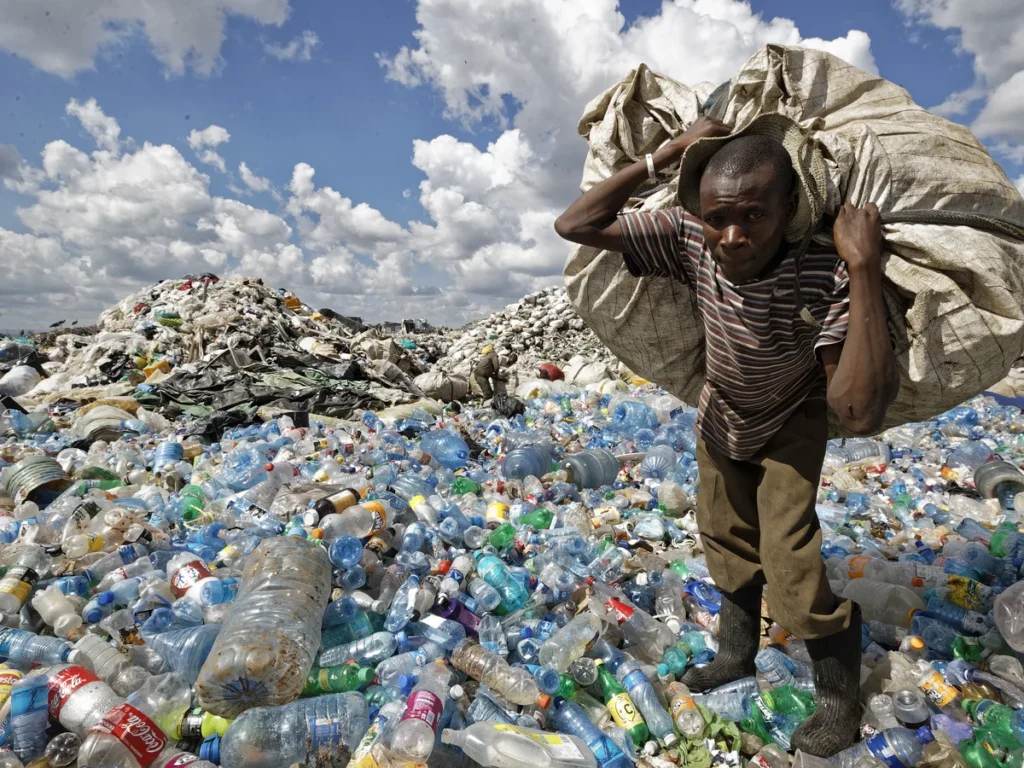- Guinea has announced a single-use plastic ban, signalling the growing momentum of the African plastic ban movement.
- Guinea prohibits the production, import, sale, and use of single-use plastics, including plastic bags and oxo-degradable plastics.
- The country now joins trailblazers Rwanda, Kenya and Somalia, who banned single-use plastics in their jurisdictions.
Africa is experiencing a vital environmental wave with the increasing rollout of tough measures on single-use plastics. With trailblazers Rwanda and Kenya having banned single-use plastics, Guinea has joined the elite club, announcing a sweeping ban on single-use plastic products and packaging.
Early this year, Somalia joined this movement, banning the use of single-use plastics beyond June 30, 2024. Authorities in the Horn of Africa country urged individuals and businesses to explore using environmentally friendly alternatives to meet their packaging needs.
This move by the West African country signals a historic moment for the continent’s push to counter the use of plastics, a key pollutant to the environment, at a time when economies are seeking financing to counter the adverse impact of climate change.
Guinea: The latest player in the African plastic ban revolution
Last week, Guinea decided to ban single-use plastics, signalling the growing momentum of the African plastic ban movement. The decree, issued by President Mamady Doumbouya, prohibits the production, import, sale, and use of single-use plastics, including plastic bags and oxo-degradable plastics.
Guinea’s ban aims to safeguard public health, promote the use of biodegradable materials, and tackle environmental pollution.
With Guinea joining the ranks of nations combatting plastic pollution, its policymakers are looking to replicate the environmental successes in countries such as Rwanda and Kenya. By adopting this ban, Guinea is also setting the stage for neighbouring countries to take similar action, furthering Africa’s collective push toward sustainability.
In 2022, UN member states signed a resolution to slam the brakes on plastic pollution worldwide. An Intergovernmental Negotiating Committee is developing a legally binding instrument on plastic pollution. This piece of regulation seeks to be finalised by the end of 2024.
Critically, these global undertakings focus on measures that consider the entire life cycle of plastics, from extraction and product design to production to waste management, enabling opportunities to design out waste before it is created as part of a thriving circular economy.
Rwanda: The trailblazer in Africa’s single-use plastic ban movement
Rwanda’s journey toward a plastic-free society began in 2008, making it one of the earliest countries in Africa—and globally—to prohibit the manufacture, import, sale, and use of plastic bags.
The Rwandan government’s efforts have led to significant positive outcomes, including cleaner cities, particularly in Kigali, and reduced plastic waste-related pollution.
Strict enforcement and active participation from citizens and businesses have been crucial in Rwanda’s success.
In addition to banning plastic bags, Rwanda expanded its efforts in 2019 by prohibiting other single-use plastic items, such as plastic bottles and disposable utensils. The country’s recycling industry has also grown significantly, with initiatives such as AgroPlast turning plastic waste into new products, further boosting the circular economy.
However, Rwanda still grapples with plastic waste from imported goods, highlighting the need for regional cooperation in addressing this challenge.
Kenya: An emerging model for environmental stewardship
Kenya followed in Rwanda’s footsteps with a ban on single-use plastic bags in 2017. The ban, considered one of the most severe globally, includes fines of up to $40,000 or four years in jail for violators.
Kenya’s plastic bag ban has had visible environmental benefits, particularly in urban areas, where streets once littered with plastic waste have become cleaner.
The ban has also brought economic opportunities for new businesses that manufacture alternative packaging materials, such as paper bags and reusable fabric carriers.
Moreover, the Kenyan government has collaborated with organizations and businesses to promote using biodegradable alternatives. Despite these successes, like Rwanda, Kenya faces the ongoing challenge of managing plastic waste from imports, especially as the country remains a key trading hub in East Africa.
Environmental benefits of single-use plastic ban
The banning of single-use plastics across various African nations has yielded a myriad of benefits, both environmental and socio-economic. First and foremost, the reduction in plastic waste has significantly impacted public health and cleanliness.
In cities like Kigali and Nairobi, the streets are cleaner, and clogged drainage systems—which contribute to flooding—have been alleviated.
Beyond the visible improvements, these bans have fostered a shift towards more sustainable practices. Many businesses have started producing biodegradable alternatives, generating employment in the green economy.
Kenya, for example, has seen the growth of paper bag manufacturing industries, while Rwanda’s recycling efforts continue to provide job opportunities.
Additionally, decreased plastic-related pollution has led to healthier ecosystems, particularly in coastal regions and rivers, where plastic waste often accumulates. This has positive implications for wildlife conservation, as the risk of animals ingesting or becoming entangled in plastic waste greatly diminishes.
Challenges and the road ahead
According to UNEP, economies worldwide need to encourage innovation and offer incentives to industries to eliminate the use of plastics. For instance, punitive taxes are needed to clamp down on manufacturing and selling single-use plastic products. At the same time, tax breaks, subsidies, and other fiscal incentives can be rolled out to encourage using alternative packaging materials.
Additionally, authorities need to step up their waste management infrastructure. This can be achieved by governments engaging stakeholders to forge legally binding instruments that help tackle plastic pollution.
While these bans are essential to reducing plastic waste, challenges remain. Rwanda and Kenya have struggled with the influx of plastics from imports, and Guinea will likely face similar issues.
Enforcement, particularly in rural areas, is another challenge, as local governments may lack the resources to ensure compliance with the ban.
There is also the issue of public awareness and the adoption of alternative materials. Changing consumer behaviour takes time, and while many urban dwellers have embraced biodegradable options, rural communities may need more support in transitioning away from single-use plastics.
Furthermore, the rise of black markets for plastic bags, as seen in Rwanda, demonstrates the need for consistent law enforcement and the provision of affordable alternatives. For the plastic ban revolution to succeed, African countries must work together, sharing knowledge and best practices and collaborating on cross-border policies to tackle plastic pollution on a continental scale.
The African plastic ban revolution is undoubtedly gaining momentum, with Guinea joining the ranks of Rwanda, Kenya, and other nations taking decisive action against plastic waste. The positive environmental outcomes in these countries serve as a beacon of hope for the continent’s future.
However, the road ahead requires continued commitment from governments, businesses, and citizens to enforce the bans, foster sustainable practices, and address the challenges imported plastics pose.
Read also: Five Kenyan Start-ups win $2.1Mn at Africa Plastics Innovation Challenge




